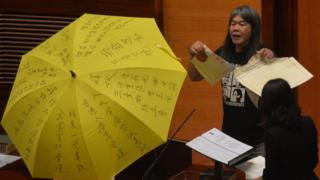 Image copyright
Image copyright
AFP
The four lawmakers are all members of the territory’s pro-democracy movement
Hong Kong’s High Court has disqualified four lawmakers who protested against Beijing when they were sworn in to the city’s Legislative Council.
They were found to have improperly taken their oaths of office in 2016.
The ruling comes just weeks after Chinese President Xi Jinping warned Hong Kong against challenging the mainland’s authority over the city.
The territory saw major pro-democracy protests in 2014 demanding electoral reform and more autonomy from Beijing.
Hong Kong, a former British colony, became a special administrative region of China in 1997. It is governed under the principle of “one country, two systems”, enjoying a high degree of autonomy.
The four disqualified lawmakers are all members of the territory’s pro-democracy movement. At the oath-taking ceremony in October 2016,
- Edward Yiu added extra lines to his oath, saying he would “fight for genuine universal suffrage”
- Lau Siu-lai read her oath in slow motion, taking almost 10 minutes
- Leung Kwow-hung brought to the stage a yellow umbrella that symbolised the pro-democracy Umbrella Movement of 2014. He also ripped up a “831 ruling,” a reference to Beijing’s white paper which determined the framework in which the city’s chief executive was to be elected
- Nathan Law, one of the student leaders of the 2014 protests, quoted Mahatma Gandhi before taking his oath, saying “you can never imprison my mind”
The ruling is a serious blow to the pro-democracy bloc in the Legislative Council and will affect its bargaining power.
The BBC’s Hong Kong correspondent Juliana Liu said the crowd waiting outside the court went silent after news emerged the four had been disqualified. Some members of the public cried and embraced each other in response to the ruling.
The court’s move comes after Beijing made the unprecedented step of issuing an interpretation of Hong Kong’s Basic Law.
The city’s quasi constitution does not mention any consequences if officials fail to be sworn in properly, nor whether they would be able to retake the oath.
But China’s parliament in Beijing decided that officials must “accurately, completely and solemnly” read out the portion of the oath that swears allegiance to Beijing.
This interpretation led to the the disqualification of two pro-independence lawmakers in November 2016.
Hong Kong court disqualifies pro-democracy lawmakers}

